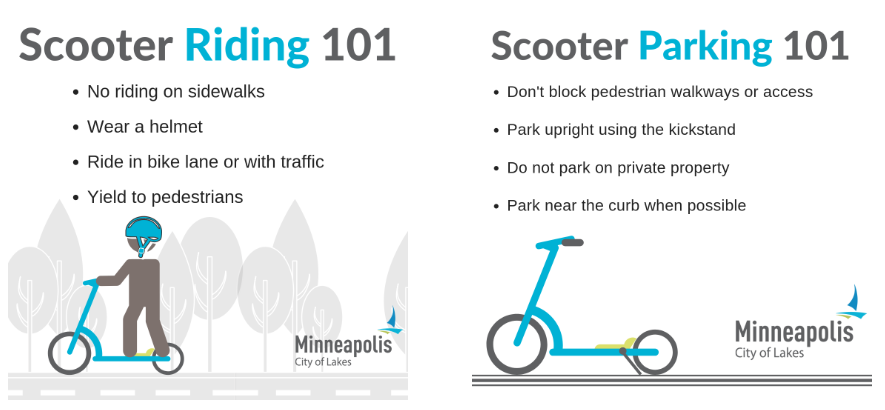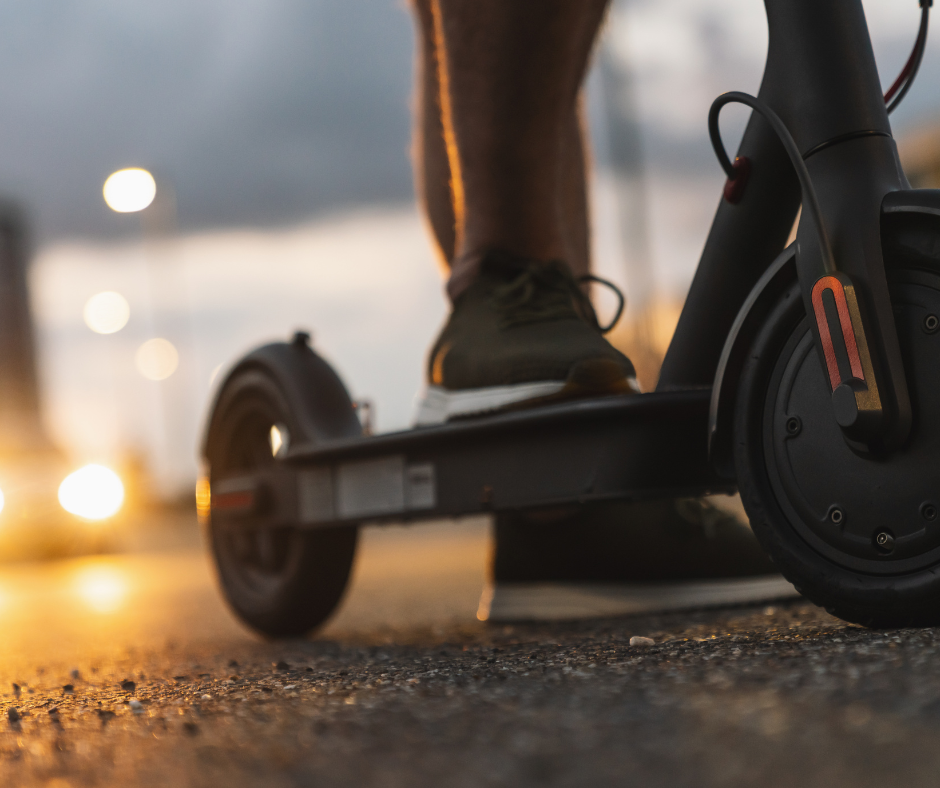Know Your Rights: Minnesota Electric Scooter Laws Explained
If you reside in the Twin Cities, chances are you’ve encountered an electric scooter.
The scooter phenomenon came to the streets of Minneapolis and St. Paul during the summer of 2018 and various vendors have partnered with local municipalities to provide their scooters as alternative ways to travel.
Minnesota State Law for Electric Scooters
Minnesota Statute 169.225 regulates scooter riding in the state of Minnesota. Here is a quick summary:
- Scooter operators are gratned the same rights and responsibilities as bicycle riders.
- Riding scooters on sidewalks is generally prohibited, unless necessary for accessing adjacent properties.
- Carrying passengers is not allowed.
- Individuals under 12 are not allowed to operate a scooter.
- Individuals under 18 must wear protective headgear.
- Scooters must be equipped with proper lighting.

Can You Get A DUI While Riding An Electric Scooter?
It is still unclear if you can get a DUI for operating a scooter while under the influence in Minnesota.
For the purposes of being charged with a DUI, "Motor vehicle" means every vehicle that is self-propelled and every vehicle that is propelled by electric power obtained from overhead trolley wires. Motor vehicle does not include an electric personal assistive mobility device or a vehicle moved solely by human power.
While it could be argued that a scooter is a personal assistive mobility device, like in the case of a handicapped man in wheelchair type scooter who was found to not be operating a motor vehicle for the purposes of DUI. Also in 2013, it was held that a Segway was not a motor vehicle for purposes of DUI.
However, recently it has been held that someone operating an electric bicycle can get a DUI, because it has the ability to be self-propelled. There have been other states that have held that an electric scooter is a motor vehicle for DUI purposes.
Based upon this ambiguity of the law in Minnesota and around the country, it would be best practice not to operate an electric scooter under the influence of drugs or alcohol. Not only could there be possible traffic citations for driving an electric scooter under the influence, you could cause serious injury to yourself or others. If you receive a ticket as a result of operating an electric scooter, contact Bruno Law to discover your defense options.
Electric Scooter Safety
Despite the regulations in place, safety is a major concern of many residents as scooter-related injuries continue to rise. Dr. Andrew Zinkel, head of the Minnesota chapter of the American College of Emergency Physicians, told the Star Tribune that about 99 percent of scooter riders aren’t wearing helmets when they’re injured.
Some scooter manufacturuers have tried to combat this issue by encouraging riders to wear helmets, but they have had little success. After all, if riding a scooter is an impomtu decision, how many people are carrying around a helmet?
Are Riders Insured In The Case Of An Accident?
A rider’s personal health insurance could help defray the cost of medical bills in the case of an accident. However, riders are most likely not insured for the damages they may cause while riding.
Auto insurance generally doesn’t cover vehicles with less than four wheels. Homeowner’s or renter’s insurance may cover an accident that occurs on a traditional bicycle, but it does not cover motorized bikes or scooters.
Most rental agreements that are required by scooter manufacturerers state that riders will be held responsible for any accidents, relieving the companies of liability.
To protect yourself from facing large costs in the case of an accident, call your insurance agent to ask how you can get coverage. If you have a homeowner’s or renter’s insurance policy, some insurance companies offer personal liability umbrella policies which cover more scenarios and include higher limits for coverage. While some of these additional policies may cover electric scooters, all claims are investigated based on their own merits.
Types of Electric Scooter Accidents
Scooter-Vehicle Accidents
If you are the driver of a car and hit a rider who is following all the rules and regulations, you could be at fault. This means that you are responsible for covering any damages to the scooter and injuries sustained by the rider.
Fortunately, auto insurance usually covers some or all of the cost through liability coverage. Minnesota is a “no-fault” state. This means that if you have auto insurance and a motor vehicle was actively involved in an accident, the accident victim will be compensated regardless of fault. Under the no-fault rules, your auto insurance provider must cover medical expenses up to $20,000, wage loss up to $20,000, and other expenses such as mileage and replacement services.
If you are a rider and hit a car or damage property due to distraction or loss of control, you could be responsible for covering damages to the vehicle and any medical bills of the passengers.
On the other hand, if you are a rider and indirectly cause a car crash, you could be badly injured and still be held responsible for damages to the cars and passengers involved.
For example, if you suddenly turn into the road without warning and a driver is forced to swerve out of the way, any accident that results is the fault of the negligent scooter rider. As the rider, you would also be liable for the injuries, disabilities, or death of anyone involved in the accident.
If you are driving an automobile and cause an accident with a scooter, you can be subject to all the criminal laws and traffic regulations as others on the road. These can include petty misdemeanor to felony charges depending on the facts of the case.
Scooter-Pedestrian Accidents
If you are a rider and hit and injure a pedestrian, damage property, or cause a car accident, you will be held responsible and most insurance policies don’t cover those expenses.
If you are a pedestrian and you cause a rider to injure themselves, you are at fault and responsible for any injuries sustained by the rider.
If you are the cause of scooter-pedestrian accident, you can be subject to all the criminal laws and traffic regulations as others on the road. These can include petty misdemeanor to felony charges depending on the facts of the case.
Malfunctioning Scooters
Reports of sticky accelerators, faulty brakes, and motor failures are some of the most common scooter malfunctions.
Because of the initial user agreement that places all liability on the rider in the case of an accident, a legal team has to prove gross negligence to win a case. “You have to show that something that is not inherently dangerous about the activity happened and caused the accident,” said Philip Rosescu, a forensic engineer for Wexco, which reconstructs accidents for litigation purposes, “if we can show that these things are malfunctioning, and unforeseeable things to the rider are happening, there’s a case.”
But, there’s no way to know whether a malfunctioning scooter claim is covered until an investigation is done. If you are the victim in an accident regarding a malfunctioning scooter, you may have a civil claim against the company that provided the scooter and its manufacturer.
Were you involved in a scooter-related accident, or the victim of malfunctioning scooter? Get in touch with our firm to learn what we can do for you.

